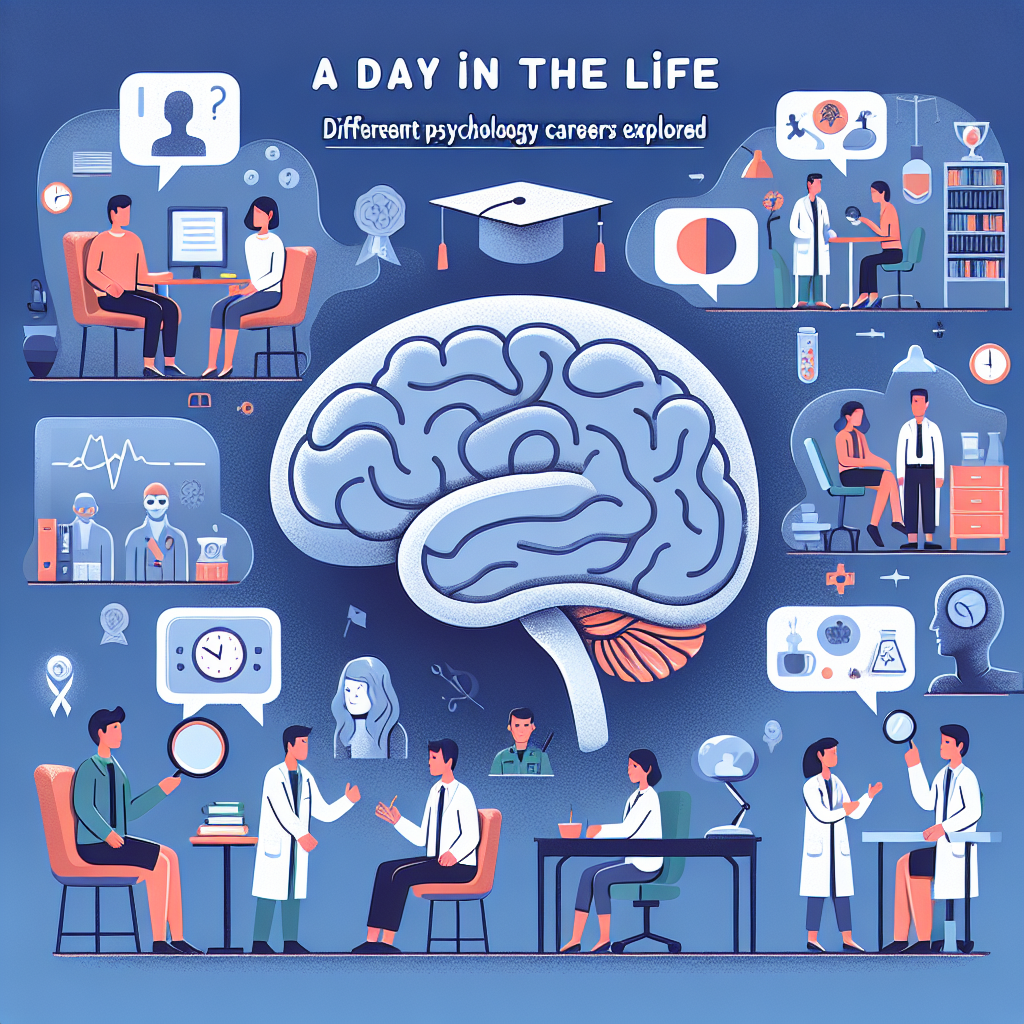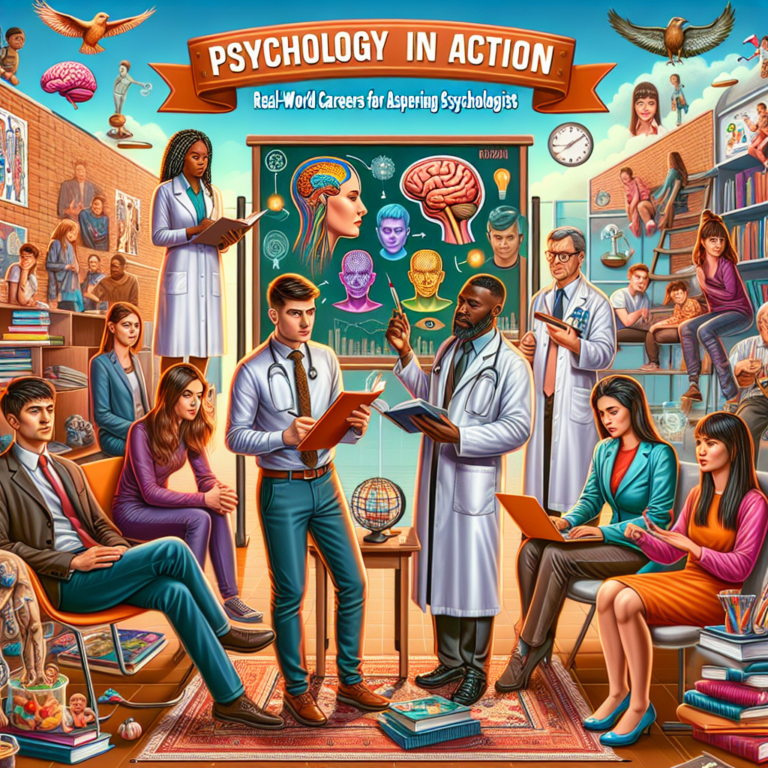
Introduction
Understanding the intricacies of the human mind is a journey that can lead individuals down various fascinating paths. A Day in the Life: Different Psychology Careers Explored delves into this realm of possibilities, illuminating the roles, responsibilities, and rewards that come with diverse psychology careers. Whether you’re a budding psychologist, a student contemplating your future, or simply curious about what these careers entail, this article offers an engaging overview that will connect you to the myriad ways psychology influences our world.
In today’s fast-paced, complexity-laden society, the demand for mental health professionals continues to rise, making psychology one of the most relevant and impactful fields. Let’s embark on a journey to explore the diverse careers within psychology, painting vivid images of what everyday life looks like in each role.
Clinical Psychologist
A Day in the Life
For clinical psychologists, the day often begins in a quiet office space, a safe haven for clients seeking help. They typically conduct therapy sessions, which can range from individual treatment to group therapy.
Morning Routine
- 8:00 AM: Arrive at the office, check emails, and prepare for clients.
- 8:30 AM: Review notes from previous sessions to provide continuity of care.
- 9:00 AM: First client arrives for a 50-minute therapy session focusing on anxiety management.
Case Study: Working with Anxiety Disorders
Anna, a clinical psychologist, had a case involving a young adult struggling with severe anxiety. The treatment plan involved cognitive behavioral therapy (CBT), which emphasized challenging irrational thoughts. Over months, Anna documented significant improvements, showcasing the impact of skilled therapy.
Relevance
This case underlines how therapeutic relationships can foster profound change, illustrating the challenge and beauty of clinical psychology.
Afternoon Activities
- 1:00 PM: Supervision meeting with a clinical intern, discussing cases and refining therapeutic strategies.
- 3:00 PM: Consult with a psychiatrist about a mutual client’s treatment plan.
Reflection
Anna regularly reflects on her practice and engages in ongoing education to stay current in the field. This dual role of provider and lifelong learner makes clinical psychology both challenging and fulfilling.
School Psychologist
A Day in the Life
School psychologists bridge the gap between education and mental health, providing students with emotional and academic support.
Morning Routine
- 7:30 AM: Arrive at the school, exchange greetings with teachers and staff.
- 8:00 AM: Conduct an individual evaluation for a student exhibiting behavioral issues.
Case Study: The Impact of Early Intervention
Mark, a school psychologist, worked with a fifth grader showing signs of learning disabilities. By implementing early intervention strategies, he provided tailored support, leading to improved academic performance and self-esteem.
Relevance
This illustrates the profound effect a school psychologist can have on a child’s life, emphasizing early intervention’s critical role in education.
Afternoon Activities
- 12:00 PM: Participate in an interdisciplinary team meeting, discussing strategies for students with special needs.
- 2:30 PM: Host a workshop for teachers on identifying mental health issues in students.
Reflection
The role of a school psychologist is not just about individual counseling; it’s about fostering a supportive school environment that encourages psychological well-being among students.
Forensic Psychologist
A Day in the Life
Forensic psychologists work at the intersection of psychology and the legal system, often finding themselves in courtrooms or correctional facilities.
Morning Routine
- 9:00 AM: Arrive at the courthouse, reviewing case files before a custody evaluation.
- 10:30 AM: Conduct interviews with involved parties to assess mental health issues.
Case Study: Custody Evaluations
Dr. Lee, a forensic psychologist, conducted a custody evaluation for a high-stakes divorce case. Through interviews and psychological testing, she provided valuable insights that influenced the court’s decision.
Relevance
This case highlights the important role forensic psychologists play in ensuring that decisions are made with a complete understanding of mental health factors.
Afternoon Activities
- 1:00 PM: Testify as an expert witness in court, explaining findings and methodologies used in evaluations.
- 4:00 PM: Debrief with attorneys regarding the case’s implications.
Reflection
Forensic psychology combines deep understanding of human behavior with legal principles, making it a unique and impactful field.
Industrial-Organizational Psychologist
A Day in the Life
Industrial-organizational (I-O) psychologists focus on the workplace, using psychological principles to improve employee performance and satisfaction.
Morning Routine
- 8:30 AM: Review organizational data from employee surveys.
- 9:00 AM: Meet with HR to discuss findings and suggest improvements.
Case Study: Enhancing Workplace Culture
Jasmine, an I-O psychologist, worked with a tech company experiencing high turnover rates. By implementing a new training program based on employee feedback, she saw a marked decrease in turnover and an increase in employee satisfaction.
Relevance
This illustrates how I-O psychologists can directly influence company culture and employee engagement through data-driven strategies.
Afternoon Activities
- 1:00 PM: Conduct a workshop on stress management for employees.
- 3:00 PM: Analyze results from a recent employee satisfaction survey.
Reflection
The integration of psychology in the workplace not only enhances productivity but also fosters a healthier work environment.
Trends in Psychology Careers
Growing Demand for Mental Health Professionals
The past few years have shown a significant increase in the demand for psychologists, driven largely by the heightened awareness around mental health issues.
| Career Path | Projected Growth (2020-2030) |
|---|---|
| Clinical Psychologists | 8% |
| Forensic Psychologists | 14% |
| School Psychologists | 3% |
| I-O Psychologists | 5% |
Importance of Specialization
As the field grows, specializations like neuropsychology and sports psychology are becoming increasingly essential, leading to a distinct career path.
Conclusion
In summary, A Day in the Life: Different Psychology Careers Explored reveals the richness and variety within the field of psychology. Each career offers a unique perspective on how understanding the human mind can transform lives. Whether through providing therapy, conducting research, or enhancing workplace culture, psychologists play a vital role in shaping a healthier society.
Your journey into psychology may lead you to impact individuals deeply, inspire communities, or contribute to academic advancements. Whichever path you choose, remember that the heart of psychology lies in understanding and caring for human experiences.
FAQs
1. What qualifications are needed to become a psychologist?
Most psychology careers require at least a master’s degree, while clinical and counseling psychologists typically need a doctoral degree (PhD or PsyD).
2. What are the key skills needed in psychology careers?
Key skills include strong communication, empathy, analytical thinking, problem-solving abilities, and ethical judgment.
3. How long does it take to become a psychologist?
Becoming a psychologist typically takes 6 to 8 years of education, including undergraduate and graduate studies, followed by supervised training.
4. Can I specialize in psychology after obtaining a general degree?
Yes, many psychologists choose to specialize in areas like clinical psychology, I-O psychology, or forensic psychology after completing their general training.
5. What is the average salary for psychologists?
Salaries vary widely by specialization and location, but the median annual wage for psychologists was about $82,180 in 2020.
Each segment of the psychology field provides numerous opportunities to make a significant difference, and exploring these careers can be both an informative and inspiring adventure.














